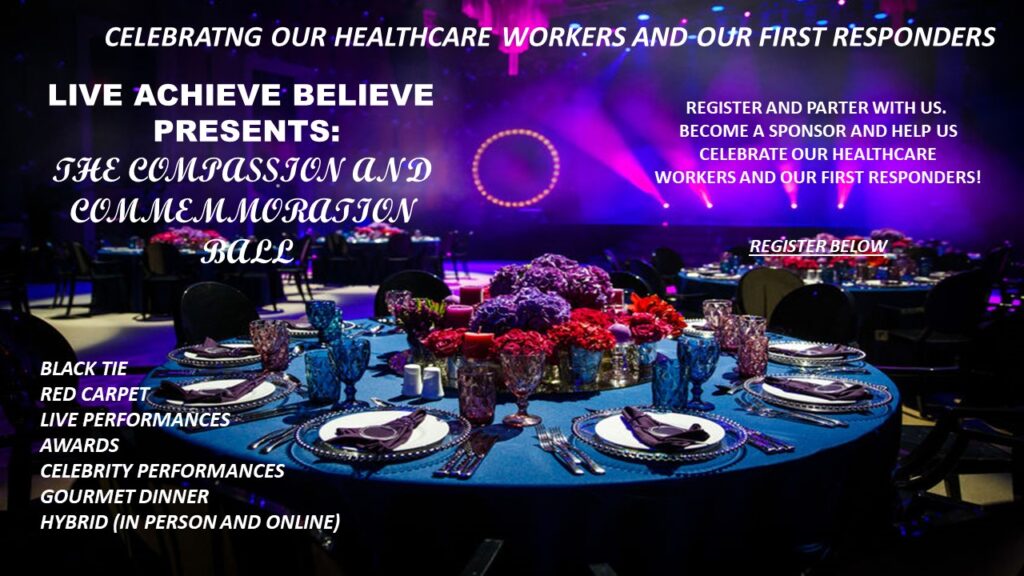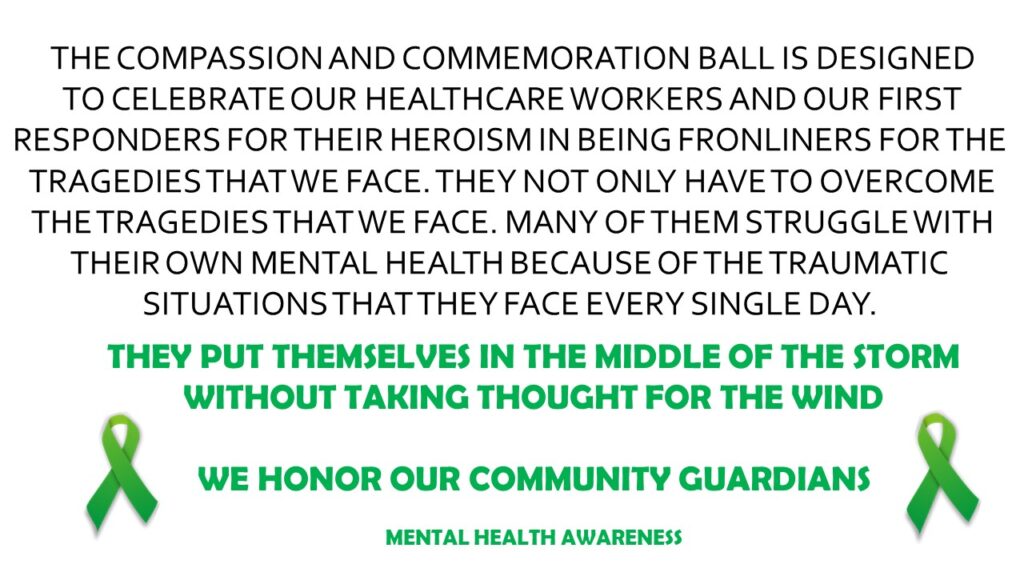LIVE ACHIEVE BELIEVE PRESENTS: THE COMPASSION AND COMMEMORATION BALL
CELEBRATING OUR HEALTHCARE WORKERS AND OUR FIRST RESPONDERS OCTOBER 26TH, 2024 AT THE HOLIDAY INN LOCATED @ 700 N. WESTSHORE BLVD TAMPA FL 33609.


HELP US CELEBRATE OUR HEROS AND BECOME A SPONSOR.
TO BECOME A SPONSOR CALL(813) 255-3592
OR CLICK THE BUTTON BELOW
Our Mission
The L.A.B. seeks to empower by providing opportunities for education, self-reflection, and self-evaluation. The services and programing challenge clients to see beyond who they are conditioned to be while finding their purpose and ultimately unlocking their power.
SUICIDE AWARENESS SHOWDOWN (SAS) Part 2B Where Are You Now? Letters to Etcetera
SAS is a four series show that is designed to take you on a journey from despondency to purpose. We are reaching back to identify the occurrences that lead up to our desire to give up. Give up on our dreams, our goals, our self worth, our integrity and ultimately our life. If we identify the root of our pain, we can then start the healing process and learn not to live out of our limiting memories, but our limitless imagination. Anything is possible, all of our dreams can be achieved. We must stay present in the moment, because the present is a gift that we have been given. Join us on this journey to purpose. The journey is never easy, but it’s worth it. Together, we are stronger. Registration will be open soon for the Suicide Awareness Showdown Part 2. Hope to see you there!








Freedom Boat Club – Boating Made Simple
ENTER TO WIN A 2 HOUR SUNSET CRUISE
The Freedom Boat Club was founded in 1989 in Sarasota, Florida. It is the oldest and largest boat club in the nation. The vision and purpose in establishing the boat club model was simple and straightforward- to deliver a hassle-free recreational boating experience for it’s members. Today, Freedom Boat Club welcomes and embraces a broad mix of members to its ranks, from first-time boaters and newbies, to seasoned salts and former boat owners, from young families to active retired. Freedom Boat Club is also actively engaged in developing new and diverse markets. Anyone who loves the water and water-related activities is embraced as a member of Freedom Boat Club!
WE ARE STRONGER TOGETHER. IT’S OK TO ASK FOR HELP.
MENTAL HEALTH - COMMON DISORDERS, EARLY SIGNS
Clinical depression is a mental health disorder characterized by persistently depressed mood or loss of interest in activities causing significant impairment in daily life. Possible causes include a combination of biological, physical, and social sources of distress. The persistent feeling of sadness or loss of interest that characterizes major depression can lead to a range of behavioral and physical symptoms. These may include changes in sleep, appetite, energy level, concentration, daily behavior or self-esteem. Depression can also be associated with thoughts of suicide.
According to the Anxiety and Depression Association of America, anxiety disorders are the most common type of mental illness. People with these conditions have severe fear or anxiety, which relates to certain objects or situations. The American Psychiatric Association define Generalized Anxiety Disorder (GAD) as disproportionate worry that disrupts everyday living. People might also experience physical symptoms including restlessness, fatigue, tense muscles, interrupted sleep. They may experience excessive anxiety on encountering everyday situations that do not present a direct danger, such as chores or keeping appointments. A person with GAD may sometimes feel anxiety with no trigger at all.
Bipolar disorder, formerly called manic-depression is a mental disorder that causes unusual shifts in mood, energy, activity levels, concentration, and the ability to carry out day-to-day tasks. There are three types of bipolar disorder.
Bipolar I Disorder – defined by manic epsodes that last at least 7 days, or by manic symptoms that are so severe that the person needs immediate hospital care. Usually, depressive episodes occur as well, typically lasting at least 2 weeks.
Bipolar II Disorder – defined by a pattern of depressive episodes and hypomanic episodes, but not the full blown manic episodes that are typical of Bipolar I disorder.
Cyclothymic Disorder (also called Cyclothymia) – defined by periods of hypomanic symptoms as well as periods of depressive symptoms lasting for at least 2 years (1 in children and adolescents). However, the symptoms do not meet the diagnostic requirements for a hypomanic episode and a depressive episode.
Schizophrenia is a chronic brain disorder that affects less than one percent of the U.S. population. When schizophrenia is active, symptoms can include delusions, hallucinations, disorganized speech, trouble with thinking and lack of motivation.
People with PTSD have intense, disturbing thoughts and feelings related to their experience that last long after the traumatic event has ended. They may relive the event through flashbacks or nightmares, they may feel sadness, fear or anger, and they may feel detached or estranged from other people. People with PTSD may avoid situations or people that remind them of the traumatic event, and they may have strong negative reactions to something as ordinary as a loud noise or an acidental touch.
ADHD is one of the most common mental disorders affecting children. ADHD also affects many adults. Symptoms of ADHD include inattention (not being able to keep focus), hyperactivity (excess movement that is not fitting to the setting) and impulsivity (hasty acts that occur in the moment without thought).
Dissociative Disorders involve problems with memory, identity, emotion, perception, behavior, and sense of self. Dissociative symptoms can potentially disrupt every area of mental functioning. Examples of dissociative symptoms include the experience of detachment of feeling as if one is outside one’s body, and loss of memory or amnesia. Dissociative disorders are frequently associated with previous experience of trama.
There are three types of dissociative disorders: Dissociative Identity Disorder, Dissociative Amnesia, Depersonalization/Derealization Disorder.
Eating Disorders are behavioral conditions characterized by severe and persistent disturbance in eating behaviors and associated distressing thoughts and emotions. They can be very serious conditions affecting physical, psychological and social function. Types of eating disorders include anorexia nervosa, bulimia nervosa, binge eating disorder, avoidant restrictive food intake disorder, specified feed and eating disorder, pica and rumination disorder.
OCD is a disorder in which people have recurring, unwanted thoughts, ideas or sensations (obsessions) that make them feel driven to do something repetitively (compulsions). The repetitive behaviors, such as hand washing, checking on things or cleaning , can significantly interfere with a person’s daily activities and social interactions. Many people without OCD have distressing thoughts or repetitive behaviors. However, these thoughts and behaviors do not typically disrupt daily life. For people with OCD, thoughts are persistent, and behaviors are rigid. Not performing the behaviors commonly causes great distress. Many people with OCD know or suspect their obsessions are not realistic, others may think they could be true (known as limited insight), Even if they know their obsessions are not realistic, people with OCD have difficulty disengaging from the obsessive thoughts or stopping the compulsive actions.
